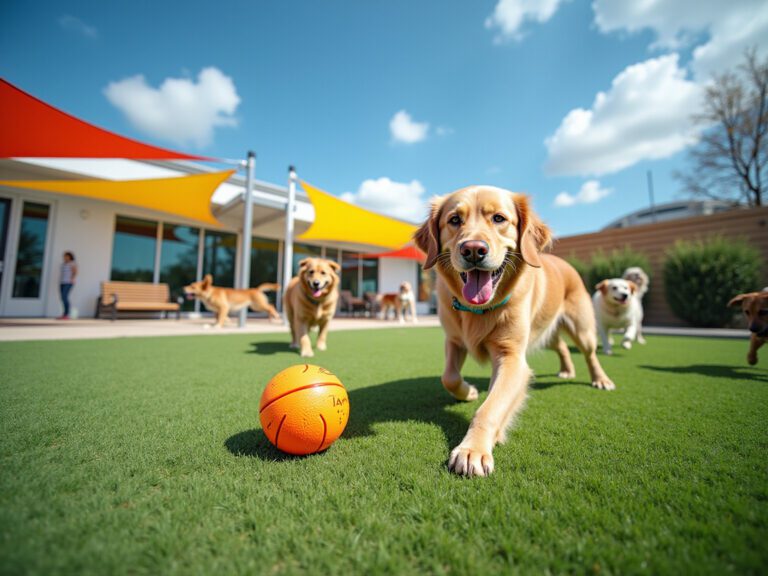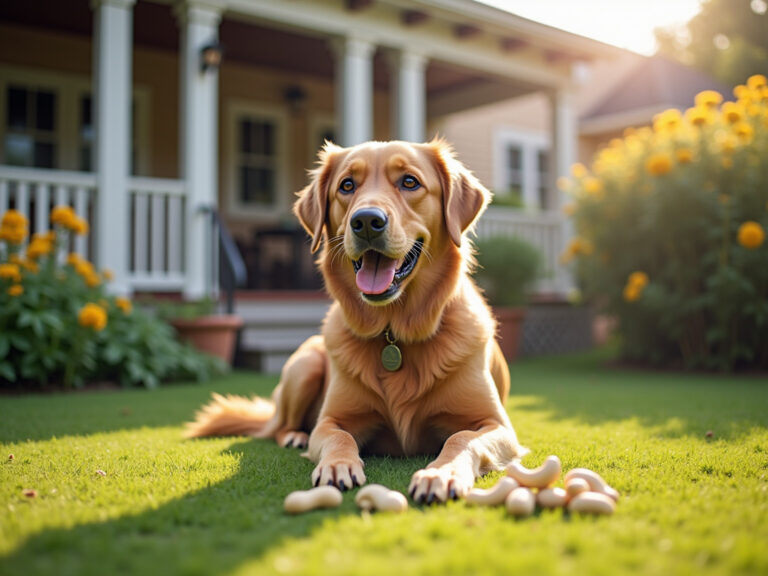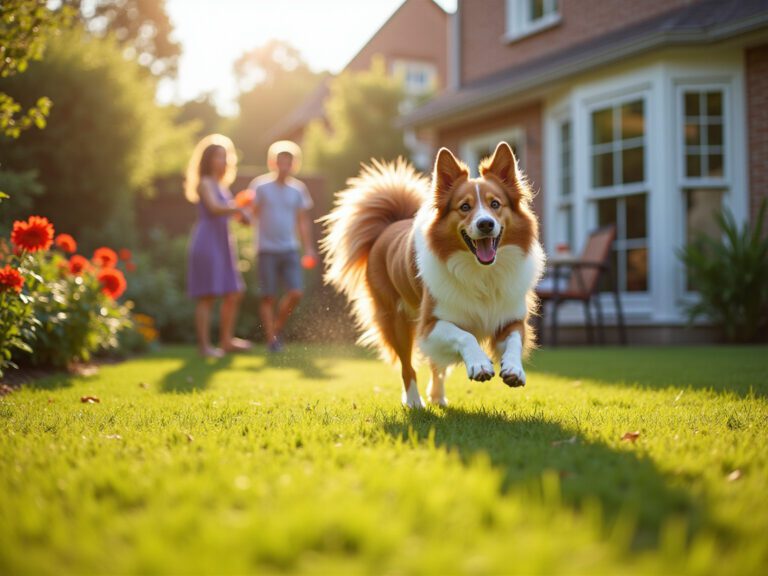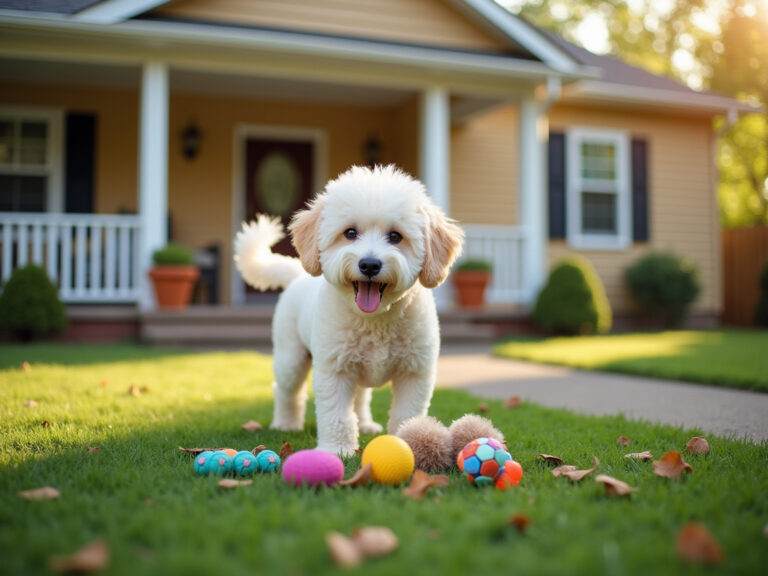Essential Care Steps for Alaskan Malamute Puppies
Overview
Caring for your Alaskan Malamute puppies is a joyful journey that begins with establishing a routine for feeding and nutrition. By implementing effective training and socialization techniques, you can foster their growth and happiness. Prioritizing health care through regular veterinary check-ups is essential for their well-being. These practices are not just steps; they are crucial for ensuring your furry family members lead happy and fulfilling lives as cherished companions. Embrace this nurturing environment, and watch your puppies thrive as beloved family members.
Introduction
The Alaskan Malamute, celebrated for its strength and affectionate nature, offers both unique challenges and delightful rewards for new puppy owners. Understanding the essential care steps for these vibrant canines is vital for nurturing a healthy and happy life. From establishing a proper feeding routine to implementing effective training and socialization techniques, each aspect of their care plays a crucial role in their development.
How can you, as a loving owner, navigate the complexities of raising an Alaskan Malamute puppy to ensure they thrive both physically and emotionally? Your furry family member deserves the best, and we’re here to help you every step of the way.
Understand the Alaskan Malamute Breed Characteristics
Alaskan malamute puppies are large, sturdy canines known for their power, stamina, and loving disposition. Alaskan malamute puppies, originally bred for heavy sled pulling, require substantial physical activity—at least two hours daily—to maintain their health and happiness. At Adventure Den, we understand the unique needs of your furry family members. We offer customized exercise routines and stimulating play spaces that enhance their physical and mental health. Alaskan Malamute puppies flourish with mental engagement and social connection, making them perfect partners for energetic families.
Their loyalty and intelligence are notable traits, but they can also exhibit stubbornness, necessitating consistent training and clear boundaries. Recognizing that these dogs are pack animals is essential for establishing a supportive atmosphere that fulfills their social requirements. With a lifespan of 10 to 14 years, alaskan malamute puppies can form deep bonds with their families, enriching lives with their playful and loving nature.
Recent studies indicate that well-exercised Malamutes are less prone to behavioral issues, underscoring the importance of regular activity and engagement. At Adventure Den, we provide ample opportunities for exercise and socialization, reinforcing their need for a stimulating and active lifestyle. Let us nurture the bond you share with your beloved pet by ensuring they lead a happy, healthy life.
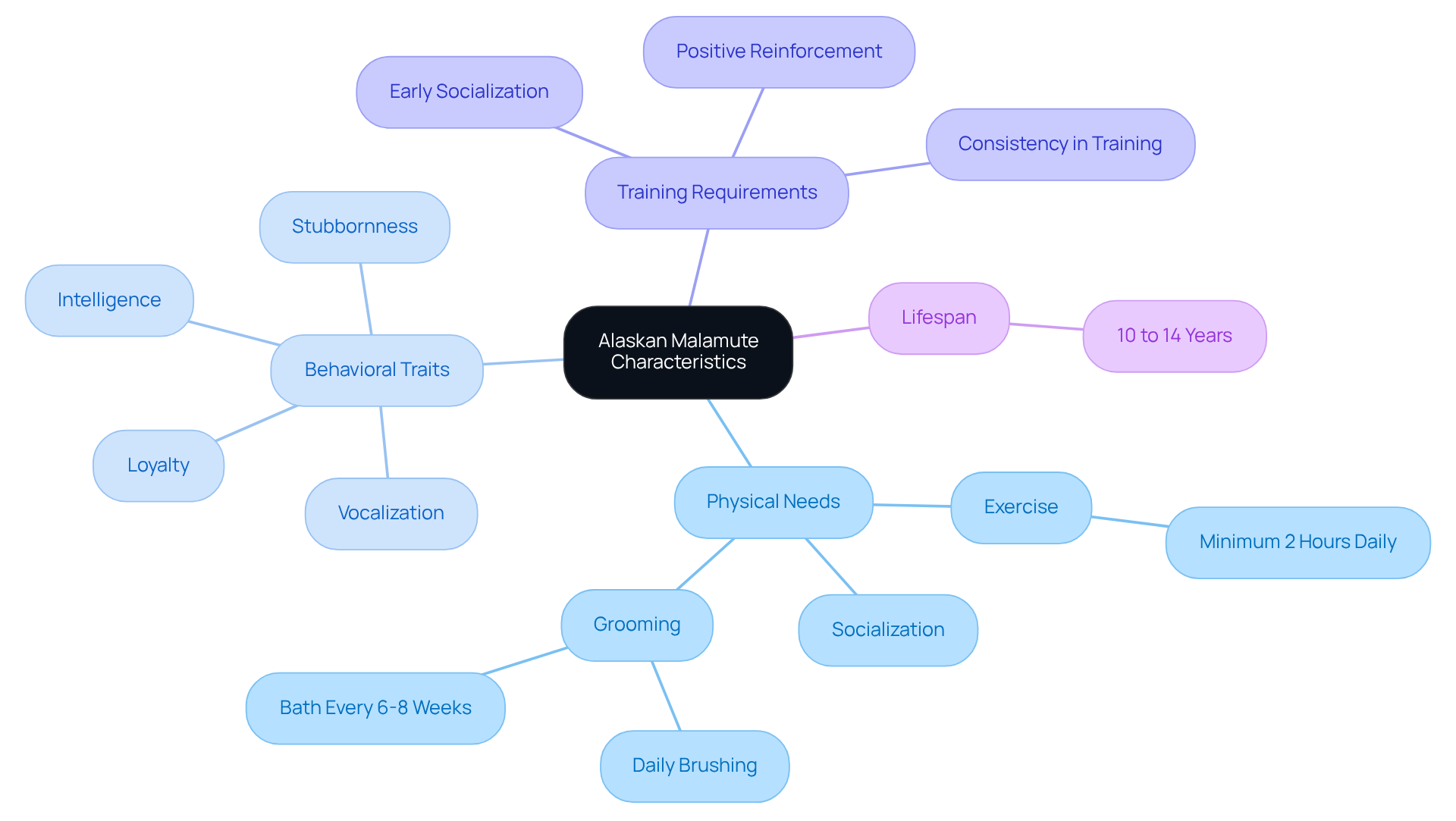
Establish a Routine for Feeding and Nutrition
Establishing a feeding routine is vital for the health and development of your furry family member, the Alaskan Malamute puppies. Initially, it’s best to feed young dogs three meals a day until they reach about six months of age. After this period, transitioning to two meals daily is advisable. As noted by Purina, “Feeding a growing dog a healthy diet can be confusing,” making it crucial to choose high-quality dog food specifically formulated for large breeds. This food should be rich in proteins and fats to support their rapid growth.
To ensure your pup stays healthy, consistently monitor their weight and adjust food portions as necessary. Overfeeding can lead to obesity, which may result in future joint issues, diabetes, and heart complications. Always check the feeding instructions on the packaging of your young dog’s food, as Purina advises, “First, you should always check the feeding instructions on the packaging of your young dog’s food.”
Consulting your veterinarian for personalized dietary recommendations is essential in providing the right nutrition tailored to the individual needs of your young Alaskan Malamute puppies. Generally, young dogs thrive with routine and portion control, so adhering to a scheduled feeding plan will foster a nurturing environment for your beloved pet.
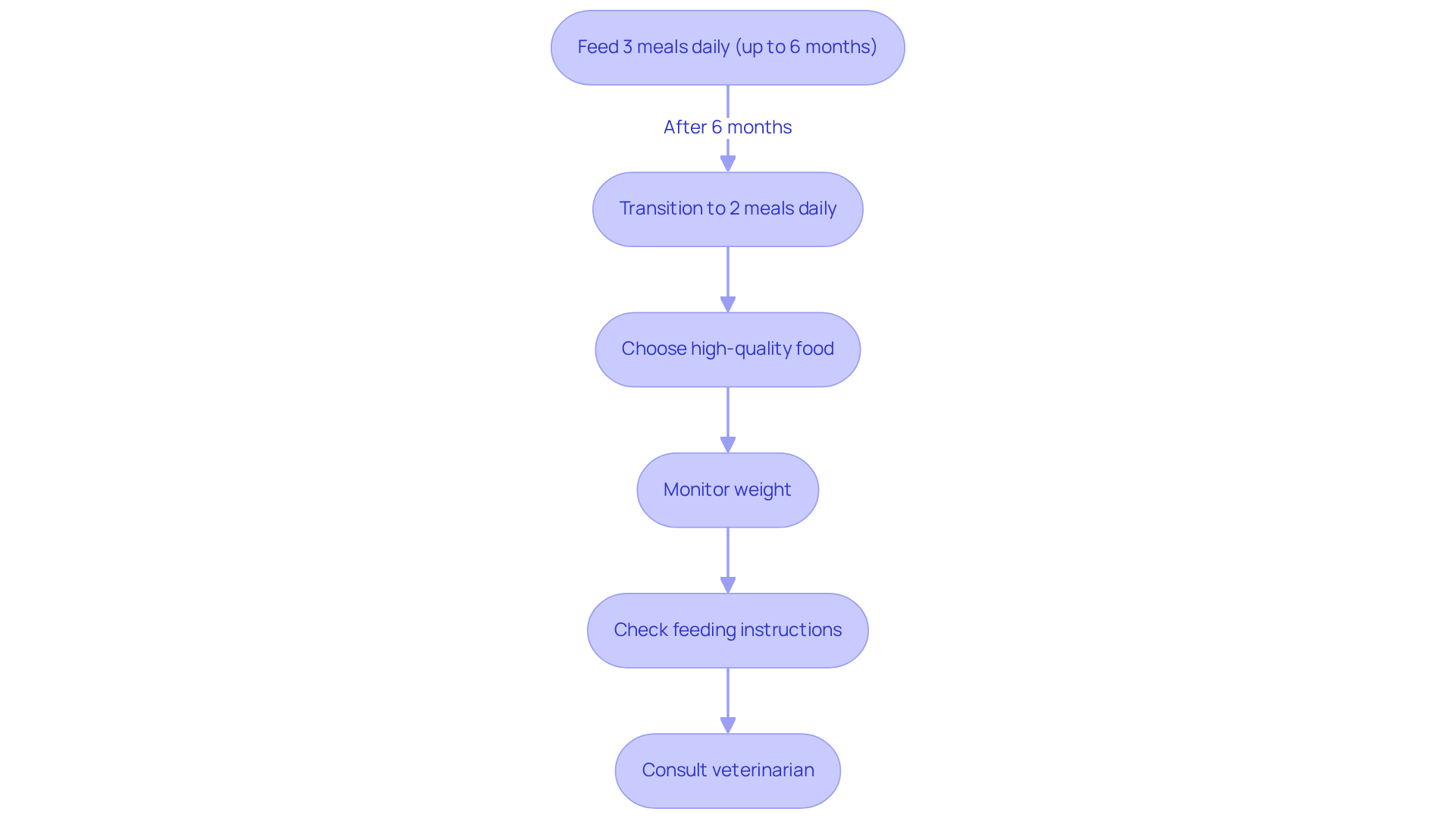
Implement Effective Training and Socialization Techniques
Start training your Alaskan Malamute puppies as soon as possible, focusing on basic commands and socialization with both dogs and people. By using positive reinforcement techniques—like treats and praise—you can effectively motivate your furry family member to exhibit desired behaviors. Research shows that short, frequent training sessions are more effective than longer ones, as Malamutes can quickly lose interest.
Socialization is vital for your young dog’s development. Expose them to various environments, sounds, and experiences to build confidence and reduce anxiety. Participating in puppy classes can greatly enhance both training and socialization for Alaskan Malamute puppies, providing a structured environment for learning and interaction. Successful socialization strategies include:
- Gradual introductions to new situations
- Consistent exposure to diverse stimuli
These strategies are essential for nurturing a well-adjusted adult dog.
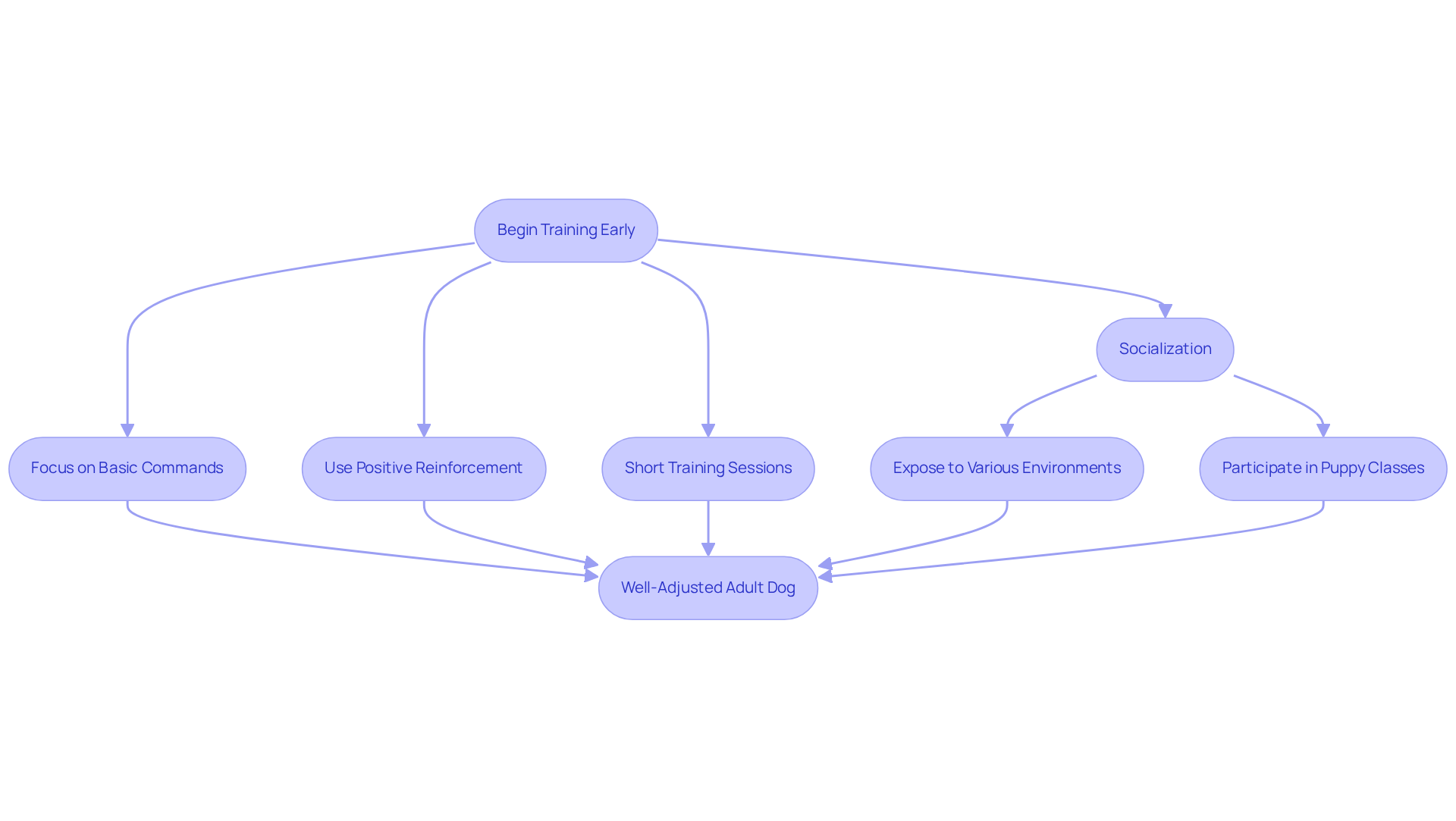
Prioritize Health Care and Regular Veterinary Check-ups
Caring for your Malamute’s health is essential, and regular veterinary examinations play a crucial role in this journey. By arranging yearly appointments for immunizations, dental check-ups, and evaluations for common breed-specific issues like hip dysplasia—affecting about 11.5% of Malamutes—and hypothyroidism, you ensure your furry family member receives the best care possible. Don’t hesitate to discuss any concerns with your veterinarian, including diet, exercise, and behavioral issues, as these factors can significantly impact your dog’s overall well-being. Regular check-ups not only facilitate early detection of potential health problems but also help your puppy enjoy a vibrant, active life. Additionally, if you plan to breed your adult dog, a clear screening test within the past 12 months is recommended to avoid passing on hereditary conditions.
In addition to veterinary visits, establishing a consistent grooming routine is vital for maintaining your Malamute’s thick double coat, keeping it healthy and free of mats that can harbor bacteria. Daily brushing helps distribute natural oils and manage shedding, especially during seasonal changes. During shedding season, using an undercoat rake effectively removes dead fur while protecting the outer coat. It’s also important to regularly check for mats in the fur, as they can lead to skin issues if not addressed promptly. By prioritizing these health care practices, you can help your Alaskan Malamute thrive and enjoy a fulfilling life as a cherished member of your family.
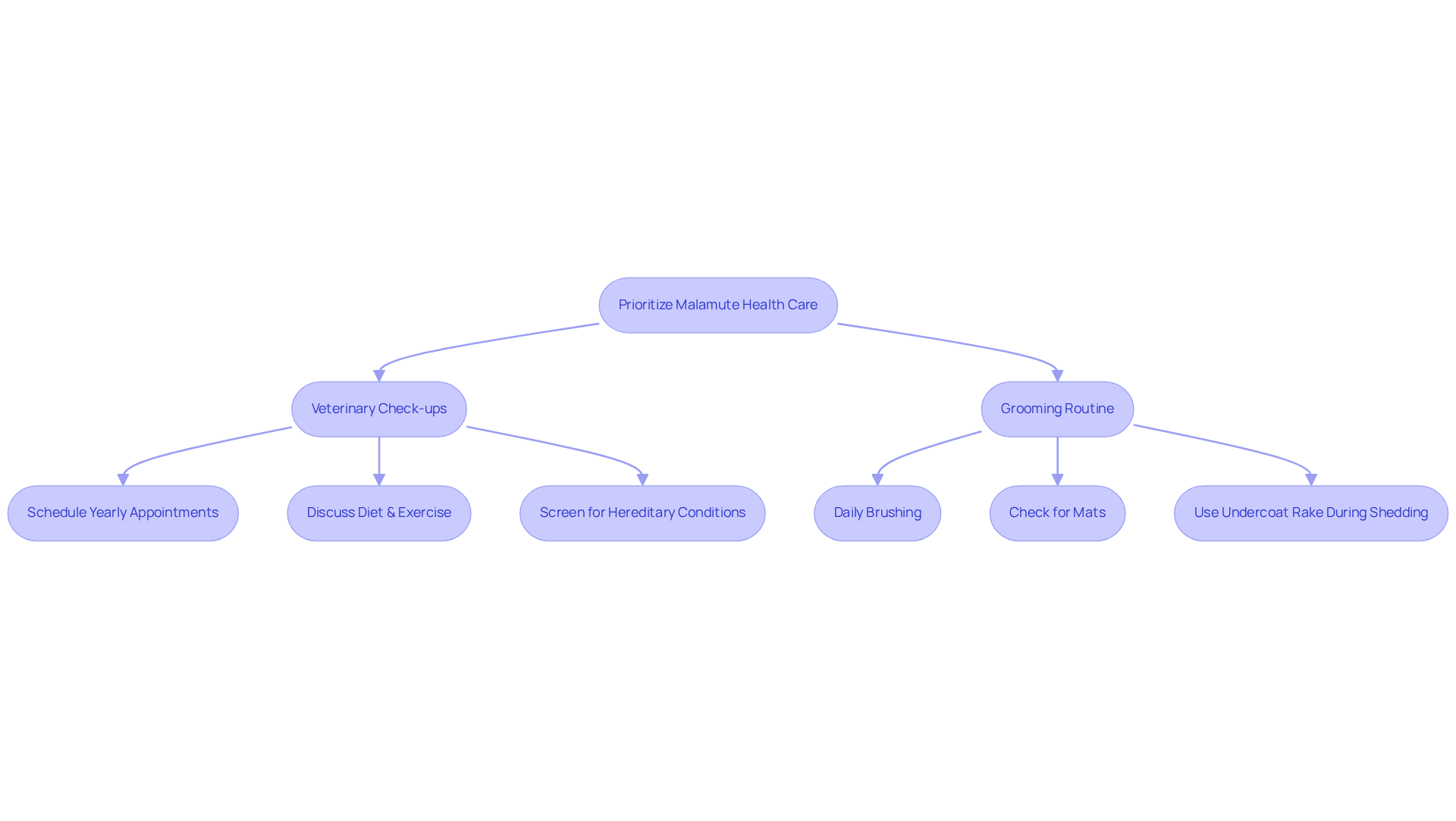
Conclusion
Caring for Alaskan Malamute puppies requires a dedicated and informed approach that embraces their unique needs and characteristics. By understanding their strong physical requirements, nutritional needs, training essentials, and health care, you can ensure your furry family members thrive in a loving and supportive environment.
Key aspects of caring for these puppies include:
- Establishing a rigorous exercise routine
- Providing high-quality nutrition
- Implementing effective training and socialization techniques
- Prioritizing regular veterinary care
Engaging in consistent physical activity not only promotes health but also strengthens the bond between you and your puppy. Additionally, proper training and socialization are crucial for developing a well-adjusted adult dog, while routine health checks help detect potential issues early, ensuring a long and healthy life.
Ultimately, embracing these essential care steps for Alaskan Malamute puppies fosters a happy and fulfilling relationship. By committing to their physical, mental, and emotional well-being, you can enjoy the loyalty and love that these remarkable dogs bring to your family. Taking the time to educate yourself on the specific needs of Alaskan Malamutes will significantly enhance your experience of pet ownership, leading to a rewarding journey with these beautiful companions.
Frequently Asked Questions
What are the key characteristics of Alaskan Malamute puppies?
Alaskan Malamute puppies are large, sturdy canines known for their power, stamina, and loving disposition. They are originally bred for heavy sled pulling.
How much exercise do Alaskan Malamute puppies need?
Alaskan Malamute puppies require substantial physical activity, needing at least two hours of exercise daily to maintain their health and happiness.
How can Adventure Den help with Alaskan Malamute puppies’ needs?
Adventure Den offers customized exercise routines and stimulating play spaces that enhance the physical and mental health of Alaskan Malamute puppies.
What are the training needs of Alaskan Malamute puppies?
Alaskan Malamute puppies are loyal and intelligent but can also be stubborn. Consistent training and clear boundaries are necessary for effective management.
Why is socialization important for Alaskan Malamute puppies?
Alaskan Malamute puppies are pack animals, so establishing a supportive atmosphere that fulfills their social requirements is essential for their well-being.
What is the lifespan of Alaskan Malamute puppies?
Alaskan Malamute puppies have a lifespan of 10 to 14 years.
How does exercise impact the behavior of Alaskan Malamute puppies?
Recent studies indicate that well-exercised Malamutes are less prone to behavioral issues, highlighting the importance of regular activity and engagement.
How does Adventure Den support the bond between pets and their families?
Adventure Den nurtures the bond by ensuring Alaskan Malamute puppies lead happy, healthy lives through ample opportunities for exercise and socialization.




